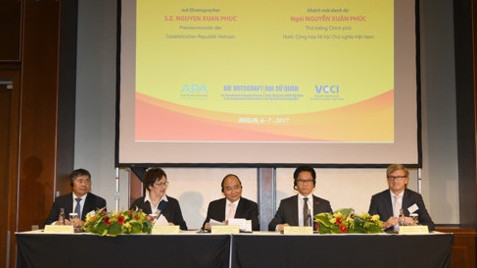


|
PM Nguyen Xuan Phuc attends Vietnam-Germany Business Forum. (Credit: VO Addressing
the Vietnam-Germany Business Forum in Berlin on July 6 with nearly 600 German
firms and more than 100 Vietnamese partners taking part, the PM said the two
countries established a comprehensive strategic partnership in 2011. Germany
is Vietnam’s top trade partner in the EU, with two-way trade hitting US$9
billion in 2016, or 20 percent of Vietnam-EU trade.
Major
German businesses such as Siemens, Mercedes and Deutsche Bank have poured
US$1.8 billion into Vietnam. The Vietnam-Germany University (VGU) in the
southern province of Binh Duong and several schools opened by German firms in
Ho Chi Minh City have helped Vietnam to improve workforce quality and deal
with issues regarding energy, transport, environmental resources, urban
planning and sustainable development.
Since the
Goethe Institute opened in Hanoi in 1997, bilateral cultural exchanges have
been strengthened. More than 100,000 Vietnamese have graduated from German
universities, he said.
Informing
German investors on Vietnam’s economy, Phuc said Vietnam’s gross domestic
product (GDP) has grown more than 6% for 30 consecutive years, rising 6.21%
to US$220 billion last year. With increasing consumption and average income
per capita of nearly US$2,300, Vietnam’s trade value of roughly US$400
billion is about 1.6 times higher than its GDP.
Vietnam
is home to 23,160 foreign-invested projects from 120 countries and
territories worth more than US$320 billion, many of which are from German
corporations.
Vietnam’s
business climate has improved, moving up nine places from 91st to 82nd among
190 countries worldwide in the World Bank’s Doing Business rankings 2016-2017.
According
to the World Economic Forum, Vietnam ranked 60th out of 138 countries in
competitiveness. The nation has also signed 12 free trade agreements, as part
of global integration commitments.
It has
also cleared barriers in many sectors, including services, telecommunications
and finance-banking by raising foreign ownership caps or selling State-owned
enterprises’ strategic stakes.
Vietnam
is working to waive licenses needed to open security accounts for foreign
investors and clear capital control measures which are contrary to
international practices.
The
domestic banking system is being restructured to meet modern banking
standards in line with international practices.
Mergers
and acquisitions have also been sped up in infrastructure, transport, airport,
highway, seaport, electricity, telecommunications, food, agriculture and
services.
The
country also boasts many leading trademarks in Asia such as Vietnam Airlines,
Vietjet Air, Petrolimex, Vinamilk, Masan, TH Truemilk, Trung Nguyen coffee,
Mobiphone and Vietcombank, among others.
The PM
noted that Germany’s technology and governance experience will help Vietnam
during the industrial revolution 4.0.
Vietnam
wished that the European country would encourage German investment in the
support industry, as well as joint-ventures in renewable energy such as solar
and wind energy.
German
firms hoped that the Vietnamese government would continue fine-tuning laws
and improving the business climate.
The
German House project in Ho Chi Minh City and VGU are also expected to create
a strong driving force for bilateral economic-trade ties.
In his
speech, Federal Minister for Economic Affairs and Energy Brigitte Zypries
hailed Vietnam for its vibrant growth and large, young workforce. He affirmed
that Germany will always be a trustworthy partner of Vietnam.
Both
sides also vowed to lift two-way trade to US$20 billion from the current
figure of US$14 billion at present.
Twenty-eight
cooperation documents worth over EUR1.5 billion were signed during the event.
Following
the event, the leader met with executives of several German corporations and
banks and expressed hope that they may soon launch operations in Vietnam.
In the
evening of the same day, PM Phuc left Berlin for Hamburg city, commencing
activities within the framework of the G20 Summit.
|
Source: NDO